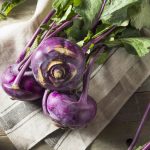Cabbage Steaks with Creamy Mushroom Sauce are a delicious way to enjoy antioxidant-rich cabbage as a hearty vegetarian main. When roasted, cabbage develops a caramelization that brings out its natural sugars. It’s paired here with a deliciously creamy sauce (featuring anti-inflammatory vegetables like shallots, mushrooms and garlic) that’s perfectly balanced with brightly acidic white wine and salty Parmesan. Keep reading for expert tips on smart substitutions, make-ahead tips and more.
Tips from the EatingWell Test Kitchen
These are the key tips we learned while developing and testing this recipe in our Test Kitchen to make sure it works, tastes great and is good for you too!
- When shopping for cabbage, try to choose one that feels heavy for its size and has nice crisp exterior leaves.
- The creamy mushroom sauce in this recipe is also great served with pasta.
- This recipe calls for fresh thyme, but you can use dried instead. However, use only half the amount because dried herbs have a more concentrated and potent flavor than fresh.
- If you prefer, you can substitute dry sherry for the white wine and use a robust herb like rosemary instead of the thyme.
Nutrition Notes
- Cabbage is a member of the cruciferous vegetable family and is brimming with vitamin C, potassium and fiber—all nutrients essential for a healthy heart and a healthy immune system.
- Mushrooms are loaded with B vitamins, which are necessary for a healthy metabolism. Mushrooms grown in ultraviolet light contain vitamin D—a nutrient that most people have a hard time getting enough of.
- Garlic is sometimes referred to as a functional food because it contains an impressive number of nutrients, including phytochemicals, magnesium, potassium and selenium. Garlic also contains an anti-inflammatory compound called allicin that is activated when garlic is chopped or crushed.
- Parmesan cheese gives a signature salty—and delicious—taste to almost everything it touches. As a hard cheese, it’s higher in calcium and lower in lactose than softer cheeses. If you’re a vegetarian, you’ll want to choose your Parmesan cheese carefully because traditional Parmigiano-Reggiano is made with rennet, an animal-derived enzyme.
Photographer: Jen Causey, Food Stylist: Emily Nabors Hall, Prop Stylist: Julia Bayless







